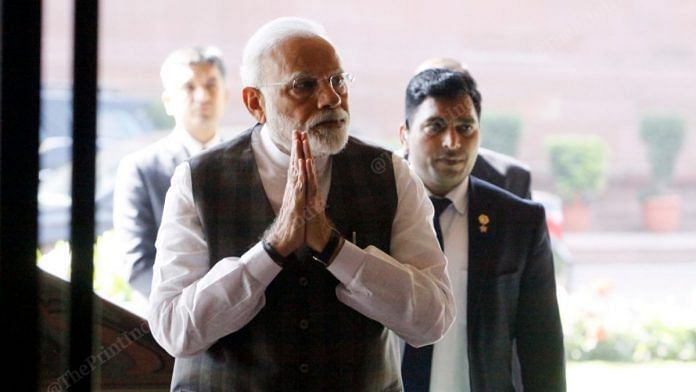New Delhi: The Narendra Modi government remains firm on its decision to not join the Regional Comprehensive Economic Partnership (RCEP) and is “not reviewing” its options even as member countries are gearing up to conclude the pact by the end of the year, ThePrint has learnt.
According to top official sources, New Delhi has decided it won’t join any trade agreement where Beijing is a member as matters have turned worse for India, especially after the Covid-19 pandemic and the ongoing border stand-off with China.
India is “not reviewing” the decision it took last year when Prime Minister Narendra Modi walked out of the agreement, said the sources.
“There is no question to join the pact now that the prime minister has given a clarion call to a self-reliant or ‘atmanirbhar’ India,” said an official who refused to be identified.
The comments come days after Thailand said all member countries have decided to sign the trade pact by the end of 2020 without India, and the deal may come into force by the middle of next year. India will have the option of signing it at a later date, it said.
The RCEP is now being negotiated among 15 countries, that includes the 10 ASEAN members — Brunei, Cambodia, Indonesia, Laos, Malaysia, Myanmar, Philippines, Singapore, Thailand and Vietnam — and their five trade partners — Australia, China, Japan, South Korea and New Zealand.
New Delhi has “rejected” the RCEP after the border stand-off with China that resulted in the killing of 20 Indian soldiers in the violent Galwan clash on 15-16 June, a second Indian official said on condition of anonymity.
The Galwan incident has also led to calls for boycott of Chinese goods by Indian traders, and ban on Chinese mobile applications by the Modi government. In April, the government had laid restrictions over inflow of foreign direct investments, aimed specifically at China.
“Politically also, the government will not be in a position to join the RCEP even if some of the conditions are made favourable for India,” the second official added.
India had walked out of the RCEP talks in November 2019, but the understanding at that time was that it would continue to negotiate the main contentious issues, which mostly entailed greater market access for Indian goods and concerns over tariff.
Also read: Modi dares China, tells Indian Army ‘our enemies have seen your fire and fury’
Other members rethinking options?
Veteran diplomat Rajiv Bhatia, who is distinguished fellow at the Gateway House, said, “In view of the recent economic decisions and geopolitical developments, India has closed the RCEP chapter. The pact may be signed either closer or during the East Asia Summit.”
He said countries that are not part of the ASEAN are rethinking their options to sign the pact. “For countries such as Australia, South Korea, Japan and New Zealand it will be difficult to have inner coherence between geopolitics and trade,” Bhatia.
However, China’s belligerence, especially in the last few months, doesn’t seem to have dented member countries’ resolve to sign RCEP.
Vietnam, which is now the ASEAN chair, has said it will continue to urge India to join the RCEP whenever it feels “comfortable” enough to join the pact.
In an interview to ThePrint last month, Vietnam Ambassador to India Pham Sanh Chau said Hanoi will ensure that it will “facilitate” India’s entry into the agreement, and New Delhi’s “way to the RCEP is always open” even as it seeks to get the pact signed under its ASEAN chairmanship.
Vietnam is going ahead with the deal despite soaring tensions between Hanoi and Beijing over China’s growing aggression in the South China Sea. Last month, Chinese ships attacked and sank a Vietnamese fishing boat near the Paracel Islands in the South China Sea. Vietnam and the Philippines have also objected to China’s announcement last week that it will carry out drills near the same island.
Similarly, Australia, which has taken on China over the origins of Covid-19 and its growing military aggression, also seems clear about joining the RCEP.
Australian envoy to India Barry O’Farrell told ThePrint last month that the “doors are open for India” to join the trade bloc. However, PM Modi and his Australian counterpart Scott Morrison didn’t discuss RCEP during their virtual bilateral summit.
Last month, New Zealand had also said that it is looking for ways to get “India an accelerated way back into the agreement”.
Also read: Australia to keep working with US, China, like-minded countries like India: Defence Minister




We should have woken up 70 years ago.
We had better wake up.
Sensible decision. Apart from our confrontation with China another reason is that India as of now is not ready or should I say competitive enough to join RCEP.
Carry out reforms, develop skills of your youth(other than IT related), build physical infrastructure, focus on domestic manufacturing and then open up your economy for a healthy competition.
Without these reforms, RCEP would result in Indian economy being owned by the Japanese, Koreans and the Chinese. Forget being a superpower or a ‘Great power’, India would end up looking like a client state, where our regional politicians would become puppets of major foreign corporations, pretty much like East India company in the 18th century.